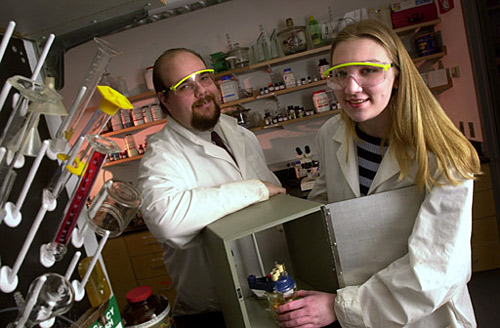Over the January interim session, biochemistry major Michelle Ferguson ’04 (Wallingford, Conn.) examined the structure of compounds to determine what affects their quality as catalysts in an intensive research project.
“I looked at different types of compounds, known as organometalics, which can be used as catalysts,” says Ferguson, who worked as an EXCEL Scholar with Chip Nataro, assistant professor of chemistry. “A catalyst is a compound that helps to speed up a reaction. The class of compounds that we looked at can be the best catalysts in some systems; however, in other systems they can be the worst catalysts. Through this research, we explored why these differences occur.”
Ferguson performed electrochemical studies of the compounds to determine their building blocks. As part of the research, she also created a new compound.
“This is a very recently developed compound which has not been studied extensively. Michelle did a great job on making inroads into understanding why and how these compounds work,” explains Nataro.
“I had never really done any synthesis of compounds, and the idea that I could produce a compound that had never been made before intrigued me,” says Ferguson.
She enjoyed the hands-on lab work involved in the project. “By putting different compounds through different reactions, I was able to make the new compound, which I then tested for an explanation of why it would be a good or bad catalyst.”
She credits her mentor with guiding her through the sometimes difficult process.
“Dr. Nataro was incredibly helpful in the lab,” she says. “I had never been in an environment where I was solely responsible for performing an experiment. Dr. Nataro gave me lots of space to be on my own, but at the same time he was always open to questions.”
Ferguson plans to attend graduate school and then continue on in industry. This EXCEL work proved to be good preparation for her future, she says.
“Lafayette provides an incredible learning environment, especially when research is involved,” says Ferguson. “Learning hands-on teaches like nothing else can. One of the main reasons that I came to Lafayette was because of the EXCEL program, which is unlike any other program I found. The professors are so welcoming and eager to do research with their students. They welcome their students’ ideas and truly make them a part of the experiment process, instead of just telling them what to do. Through the EXCEL program, Lafayette enables any of its students to learn about something such as organometalics in more detail or to test out what research is really like, since a lot of the students do plan to go into industry.”
She adds, “Lafayette in general has been an incredible experience for me. The professors are unlike any others. They are thrilled to do research and to share it with their students. There is such a variety of projects that students can choose to work on, and each will give the students a different view of chemistry. I could not have picked a better school to help me better my education as well as provide me with the lab background that will greatly help me after college.”
A graduate of Mark T. Sheehan High School, Ferguson is involved in the American Chemical Society and is a member of Lafayette Concert Choir as well as Madrigal Singers.

A National Leader in Undergraduate Research. Michelle Ferguson ’04 coauthored an article in the Journal of Organometallic Chemistry with Chip Nataro, assistant professor of chemistry.
